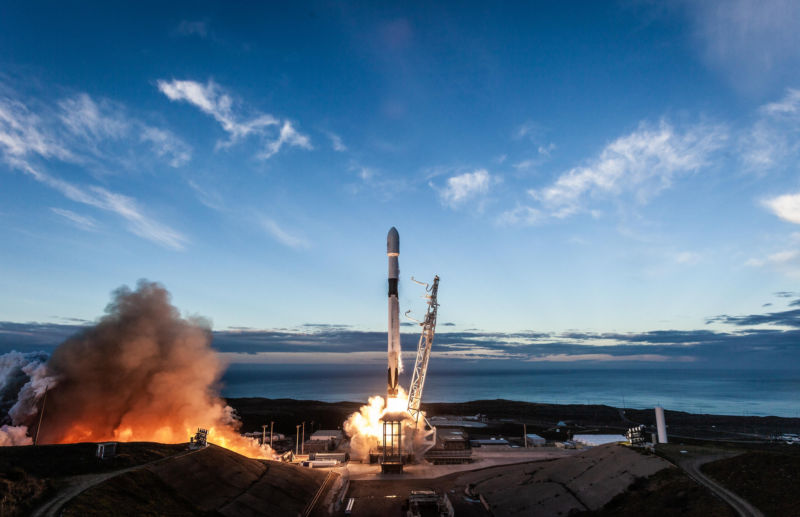
Last summer, the Trump administration announced that it was opening negotiations with the European Union to achieve “fairer, more balanced trade” on behalf of US corporations, workers, and consumers. Since then, the talks have proceeded in fits and starts, with the president threatening auto tariffs if he didn’t like the deal struck by the current US Trade Representative, Robert Lighthizer.
As part of this process, US companies were apparently asked what grievances they had concerning current barriers to free trade with the European Union. The most prolific US rocket company, SpaceX, was among those that responded, and the company used the opportunity to complain about foreign subsidies propping up its competitors for commercial satellite launches.
Large subsidies
On Dec. 10, SpaceX director of commercial sales Stephanie Bednarek wrote to Edward Gresser, chair of the Trade Policy Staff Committee in the Office of the US Trade Representative. The letter was first reported on by a French publication, Les Echos. A copy was then shared in the NASASpaceFlight.com forums.
“The largest constraint to the expansion of SpaceX launch services to European governments and companies is the continued government subsidization of the European launch vehicle programs,” Bednarek wrote. “It is essential that American commercial launch providers are able to compete fairly in European government and commercial space launch tenders.”
The letter cites European Space Agency and French support for Arianespace—nearly 19 percent of ESA’s total €5.75 billion budget in 2017 went to the launch company, according to Bednarek. Arianespace markets the Ariane 5 rocket for geostationary satellite launches, a European version of the Soyuz rocket, and Vega rocket for smaller payloads. European governments are heavily subsidizing the development of the Ariane 6 and Vega-C rockets, which could fly as early as next year.
Arianespace also benefits from subsidized infrastructure to assemble and process its rockets, manufacture solid rocket motors, and operate launch facilities. “Annual reimbursements for the spaceport (in French Guiana) and direct subsidies for its launch vehicles allow Arianespace to offer its services on the international commercial market at an artificially low price and only charge for operational costs,” Bednarek wrote.
As part of the US trade negotiations with the European Union, therefore, SpaceX sought new rules to ensure that such subsidies would not provide Arianespace an unfair advantage in the competition for satellite launches. SpaceX also sought “fair market access” to launch contracts for European governments and corporations.
Other countries, too
SpaceX does not appear to be concerned about Europe alone. Bednarek had previously written to Gresser on October 30 about the global launch market in general. “Subsidies help protect these foreign launch service providers from American competition and provide an imbalanced competitive advantage that threatens fair trade,” she wrote.
The letter then cites several launch providers: Europe’s Arianespace, the China Great Wall Industry Corporation, Russia’s Khrunichev factory, and India’s Antrix corporation. Subsides to these ventures in the form of money for development, free use of launch facilities, processing, and more artificially reduce the price of these rockets on the open market, Bednarek asserted.
It’s not clear what effect these letters have had—again, the European trade negotiations have largely focused on tariffs.
Battle for commercial launches
In reality, SpaceX has been winning a greater share of commercial launches despite these subsidies.
When it comes to customers, there are several categories of payloads for which companies like SpaceX and Arianespace compete. The market for national security payloads and NASA missions (The James Webb Space Telescope launch on an Ariane 5 rocket is a notable exception, bartered between NASA and ESA) are typically closed to Arianespace. Likewise, Russian military payloads fly on Russian rockets and Chinese payloads on Chinese rockets. Approximately two-thirds of the global launch market is therefore effectively closed to competition.
So the real battle is typically over “commercial” launches—payloads for private satellite companies or countries too small to have their own launch programs. In this market, SpaceX has made significant inroads into territory once long dominated by Arianespace and the Russian launch industry. Those two foreign entities use to hold about 80 percent or more of the commercial launch market. SpaceX now captures one-half to two-thirds of new contracts in this category due to its lower prices.
Until recently, it has primarily been the Europeans complaining about unfair price subsidies. In a 2018 interview, the then-chairman of ArianeGroup, Alain Charmeau, told Ars that SpaceX is heavily subsidized by NASA and the US military because they pay inflated rates for launches.
“The price for a US customer is not the same as the price for a commercial customer,” he said. “You can call it what you want, but that is a fact. It is known that the Air Force has procured launches at $100 million, when on the commercial market the price is well below for the same service.”
There used to be some substance to these claims as NASA was instrumental to supporting SpaceX in its early years. Without a critical NASA contract a decade ago for cargo delivery to the International Space Station, the Falcon 9 rocket probably would not exist today. However, the majority of missions SpaceX flies are now for non-governmental customers. In terms of higher launch costs, the US military says it pays more for launches because of its mission assurance requirements.
Overall, it is true that Europe heavily subsidizes its launch industry, because it does not want to be beholden to non-European countries to get its assets into space. While it is also correct that NASA has provided SpaceX with important contracts, there is no question that the company’s lean design has lowered costs for the space agency and the US Air Force. It is even possible to say that SpaceX has reduced launch subsidies in the United States since it came into existence.
https://arstechnica.com/?p=1462597

